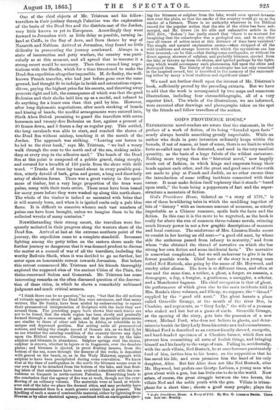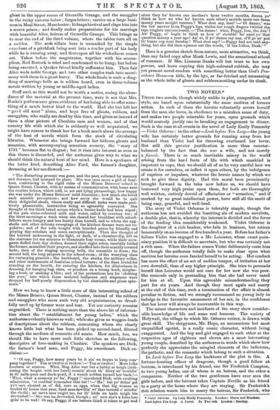GOD'S PROVIDENCE HOUSE.* EXPERIENCED novel-readers are aware that the statement,
in the preface of a work of fiction, of its being "founded upon facts" nearly always heralds something grossly improbable. While an author who deals in pure invention ordinarily keeps within the bounds, if not of reason, at least of sense, there is no limit to which facts so-called may not be distorted, and used in the very smallest quantity, as the basis of a huge fabric of the wildest caricature. Nothing more trying than the "historical novel," now happily much out of fashion, in which kings and emperors bump their heads against each other, and the great and good ones of the earth are made to play at Punch and Judith, on no other excuse than the introduction of some trifling incidents connected with their career. It must make fiction itself topheavy that it stands" based upon truth," the basis being a peppercorn of fact and the super- structure a mountain of fiction.
God's Providence House, ticketed as "a story of 1791," is one of those bewildering tales in which the muddling together of bits of " history " with an immense amount of nonsense, as utterly improbable as a Chinese romance, spoils both the facts and the fiction. In this case it is the more to be regretted, as the book is really far above the run of common three-volume novels, evincing much literary power in not a few graphic descriptions of manners and local customs. The misfortune of Mrs. Linnreas Banks seems to consist in her having an old aunt—" a good old aunt, by whose side the authoress passed from infancy to maturity," and from whom "she obtained the thread of narrative on which she has strung her own fiction and some incidental facts." The narrative is somewhat complicated, but we will endeavour to give it in the fewest possible words. Chief hero of the story is a young man called Ned Rostock, also going by the name of Mr. Heywood, and sundry other aliases The hero is at different times, and often at one and the same time, a robber, a ghost, a forger, an assassin, a demagogue, a fop, a burglar, a gentleman, a smuggler, a scholar. and a Manchester bagman. His chief occupation is that of ghost, the performance of which gives rise to the main incidents told in Mrs. Banks's three volumes, and fills up, we suppose, the " thread" supplied by the "good old aunt." The ghost haunts a place called Grenville Grange, at the mouth of the river Dee, in Cheshire, and represents, as "Grey Lady," the wife of a yeoman who staked. and lost her at a game of cards. Grenville Grange, at the opening of the story, gets into the possession of a new owner, Michael Ford, who does not believe in ghosts, and deter- mines to banish the Grey Lady from his estate as a bad encumbrance. Michael Ford is described as an extraordinarily shrewd, energetic, and hard-headed specimen of a Cheshire farmer, which does not prevent him committing all sorts of foolish things, and bringing himself and his family to the verge of ruin. Falling in, accidentally, with the arch villain, Ned Bostock, he at once becomes passionately fond of him, invites him to his house, on the supposition that he has saved his life, and even promises him the hand of his only daughter, Alice. But fair Alice does not like Ned Bostock, alias Mr. Heywood, but prefers one George Latharn, a young man who goes about with a gun, but has little else to do in the world. Now arises, of course, the great struggle between the two lovers, the villain Ned and the noble youth with the gun. Villain is trium- phant for a short time ; shoots a good many people ; plays the
• God's Proridence House. a fkoryof 1791. By Ws. G. Linasea Banks. Throe vols. Lonlon: Bewley.
ghost in the upper rooms of Grenville Grange, and the smuggler in the rocky caverns below ; forges letters ; carries on a large busi- ness in Meal Street, Manchester; kidnaps hisrival and claps him into a secret prison ; and finally makes preparations for his marriage with beautiful Alice, heiress of Grenville Grange. This brings us to near the end of the third volume, where the tables turn all on a sudden. The arch villain here is unmasked by the simple expedient of a pitchfork being sent into a tender part of his body while he is running away, and thereupon all his wickedness comes out. Taken before the magistrates, together with his accom- plices, Ned Bostock is tried and condemned to be hung; but before being executed, a Quaker friend kindly suffocates him. Then fair Alice weds noble George, and two other couples rush into matri- mony with them in a great hurry. The whole finale is such a ding- dong of marriage bells as is seldom heard, even in three-volume novels written by young or middle-aged ladies.
Stuff such as this would not be worth a notice, seeing the abun- dance of the material at the present time, were it not that Mrs. Banks's performance gives evidence of herbeing able to offer some- thing of a much better kind to the world. Had she but left her "good old aunt" alone, and kept free of ghosts, robbers, and smugglers, who really are dead by this time, and given us instead of them a clear picture of Cheshire men and women, and of that country life with which she is evidently so well acquainted, we might have reason to thank her for a book much above the average of the host of novels which form the stock of circulating libraries. Whenever she brings forward her hideous ghosts and assassins, with accompanying sensation scenery, the "story of 1791" becomes fiat to disgust ; but it rises into interest as soon as this theme is discarded, and the authoress gives way to what we should think the natural bent of her mind. Here is a specimen of the latter kind, describing Alice Ford, the farmer's daughter, dreaming at her needlework :—
" The disturbing present was gone, and the past, softened by memory and distance, had usurped its place. She was once more a girl of four-
teen, conforming to the rigid rules of the Misses Briscoes' school in Queen Street, Chester, with no means of communication with home save the routine letters, which told, in set and lying phraseology, how happy she was under the Misses Briscoes' mild dominion ; how much she loved
each amiable preceptreas ; and how sorry she would be to quit their delightful abode, where study and difficult tasks were made posi-
tively pleasurable, instruction being so agreeably conveyed. She
thought of the thick bread across which a butter knife had been wiped ; of the pale stone-coloured milk and water, called by courtesy tea ; of
the three mornings a week when she shared her breakfast with school- fellows more hungry and less dainty than herself, and to whom the egg- shells and other delicate sweepings of the kitchen dresser were not re- pulsive; and of the rolls bought with hoarded pence by friendly and pitying day-scholars and eaten surreptitiously. Then she thought of the hurried undressing in the light, or dark, of a chamber-dip, left on the staircase for ten minutes to illuminate four rooms, while their occu- pants doffed their day clothes, donned their night robes, carefully folded the forme; mumbled their prayers, and shuffled into their scantily covered beds; then of the ringing morning bells, the scramble to dress ; the second bell, the long prayers in the school-room; • of the wearying class for curtseying practice ; the backboard, the stocks, the military collar, and other instruments of feminine school torture ; of the fines levied for
standing on the hearth, for entering the kitchen, for dilatoriness in dressing, for hanging bag, slate, or pinafore on a wrong hook, misplac-
ing a book, or making a blot ; and of the pretentious box for clothing the poor,' into which these mulcted halfpence and sixpences were dropped for halt-yearly dispensation by the charitable and pions spin- sters."
How we long to know a little more of this interesting school of the Misses 1363CO3, Queen Street, Chester, instead of the robbers
and smugglers who seem such very old acquaintances, so dread- fully used up by former wear and tear. Yet our curiosity remains ungratified. There is nothing more than the above bit of informa- tion about the "establishment for young ladies," which the authoress evidently knows so well ; while she gives us waggon-loads of descriptions about the robbers, concerning whom she clearly knows little but what has been picked up second-hand, filtered through the medium of romantic old aunts. How much, too, we should like to have more such little sketches as the following, descriptive of love-making in Cheshire. The speakers are Dick, the farmer's head man, and Peggy, his sweetheart. Dick ex- claims :—
" Oi say, Peggy, how many years be it sin' we begun to keep com- pany together ? Ten or twelve oi reckon.'—' Ten or twelve I More bike
foorteen or sixteen. Whoi, Mialt Aliso wur but a babby so hoigh (indi-
cating the height with her hand) runnin' about th' dairy an' tumblin' in th' milk-pans and duck-pond, if a wench nobbut turned her back:— Whoi, what a memory yo' ha', Peggy !' -ejaculated Dick, with exulting
admiration oi couldna' remember that fur! Ha! but yo' didna' get yo'r ears admiration, as oi' did, sure as eggs, when that big woman as tended th' house that year, fund meadawdlin' wi' thee instead o' mindin' the cholla ; an' serve aces roight too, for th' little un hadn neigh bin
drownded.'—' She was na drownded, though; an' now she's a foine loss gout' to be wed ! Oi say, Peggy, if our betters think it toime to get wed afore they ha' known one another's faces twelve months, &inns yo'• think as how we who ha' known each other's moinds more nor them manny years moight venture ? What doat say, loss? '—'0i dunno,' was the low answer from Peggy's lips, whilst her rough fingers twirled the tape ringlets unconsciously.—' Tha dunno ! whoi, Peggy, loss, tha dun' An' Peggy, oi' begin to think as how oi' shouldn' ha' axed yo' that question mainly a year ago! An' so, if yo' dutina say nay, oi'll go an' put th' banns oop next Sunday ! What dost say? '—Peggy had not said any- thing, but she did then squeeze out the words, 'If tha bikes, Desk.'"
Here is a genuine sketch from nature, more attractive, we think, than any faded copy after Monk Lewis, and the sensational school of romance. If Mrs. Linumus Banks will but trust to her own powers, and leave copying this high-coloured rubbish, she may yet present novel-readers with something better than God's Pro- vidence House—a title, by the bye, as far-fetched and unmeaning as the whole tribe of ghosts and robbers nestling under its cloak.































 Previous page
Previous page